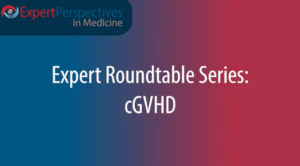Oncology
Chronic Graft-versus-Host Disease
Can Chronic Graft-versus-Host Disease Be Prevented?
I do not think that I can underscore enough that progress has been made in reducing cGVHD rates, and PTCy has been an important factor in this progress. The use of this prophylactic regimen has markedly reduced moderate to severe cGVHD incidence. Historically, our ways of preventing GVHD were primarily focused on reducing acute GVHD, but, with few exceptions, we did not have a strong ability to reduce cGVHD.
<br>
There are a lot of exciting areas of research that may perhaps further reduce overall cGVHD incidence and its severe manifestations beyond what we are seeing with PTCy therapy. One area that appears quite promising is graft manipulation through allogeneic T-cell immunotherapy, where a CD34-positive cell–enriched graft and regulatory T cells are infused, followed 2 days later by the infusion of a smaller-than-typical amount of conventional T cells. Preliminary data from studies using this approach in patients receiving myeloablative transplants have been very promising, showing reduced cGVHD rates.
<br>
A phase 2 study is looking at the addition of maintenance ruxolitinib to tacrolimus and methotrexate prophylaxis, and preliminary data on cGVHD incidence appear quite promising. Another area of research is the use of B-cell–depleting therapies to prevent cGVHD, and there are encouraging and interesting data with posttransplant obinutuzumab suggesting that it may help reduce the risk of steroid-requiring cGVHD.
<br>
Finally, studies are looking to optimize PTCy therapy by examining whether we can minimize some of its potential toxicities, which can include blood count abnormalities, infections, cardiovascular complications, and hemorrhagic cystitis. A single-center trial is looking at adding ruxolitinib to PTCy, with the hope that decreasing the dose of PTCy can perhaps reduce some of its associated toxicities and that the prolonged ruxolitinib exposure will reduce cGVHD rates. Whether this will be a successful approach has yet to be determined, but this is an area of active research.
<br>
I think that the research community can be proud to have achieved reduced cGVHD rates with the use of PTCy. However, there is still work to be done, and the next 5 to 10 years will be an exciting time as we see the results of some studies that are currently in the works exploring other methods of lowering the risk of cGVHD.
Abedin S, Furqan F, Runaas L, et al. Early safety and feasibility results from a phase II trial of de-escalated PTCy and ruxolitinib for GVHD prophylaxis in older patients undergoing reduced intensity conditioning allogeneic HCT. Blood. 2024;144(suppl 1):1039. doi:10.1182/blood-2024-200832
<br>
Bolaños-Meade J, Hamadani M, Wu J, et al; BMT CTN 1703 Investigators. Post-transplantation cyclophosphamide-based graft-versus-host disease prophylaxis. N Engl J Med. 2023;388(25):2338-2348. doi:10.1056/NEJMoa2215943
<br>
Cutler C, Kim HT, El Banna H, et al. Effective prevention of steroid-requiring chronic GVHD with B cell depletion: a randomized, placebo-controlled trial. Transplant Cell Ther. 2024;30(suppl 2):S26-S27. doi:10.1016/j.jtct.2023.12.055
<br>
DeFilipp Z, Kim HT, Knight LW, et al. Low rates of chronic graft-versus-host disease with ruxolitinib maintenance following allogeneic HCT. Blood. 2025;145(20):2312-2316. doi:10.1182/blood.2024028005
<br>
Hexner EO, DeFilipp Z. Update in GVHD prophylaxis: novel pharmacologic and graft manipulation strategies. Am J Hematol. 2025;100(suppl 3):30-39. doi:10.1002/ajh.27597
<br>
Meyer EH, Salhotra A, Gandhi AP, et al. ORCA-T® demonstrates improved survival free of chronic GVHD compared to conventional allogeneic hematopoietic stem cell transplant: a randomized phase 3 trial in advanced hematologic malignancies [abstract OS15-01] [session OS15 oral session 15]. Abstract presented at: 51st Annual Meeting of the EBMT; March 30-April 2, 2025; Florence, Italy.
<br>
Shaffer BC, Gooptu M, DeFor TE, et al. Post-transplant cyclophosphamide-based graft-versus-host disease prophylaxis attenuates disparity in outcomes between use of matched or mismatched unrelated donors. J Clin Oncol. 2024;42(28):3277-3286. doi:10.1200/JCO.24.00184











